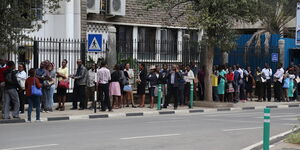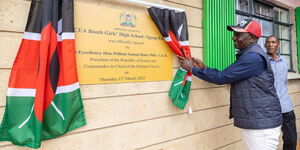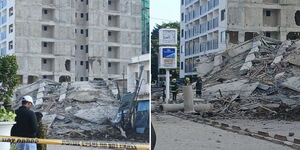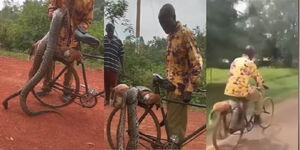The Mau Mau Nairobi section pulled off one of the biggest and most daring prison breaks in 1954 from the Lukenya Prison.
Nairobi Freedom Fighters were informed of the cruelties that their captured colleagues were undergoing in detention.
Lukenya Prison was located about 36 kilometres from Nairobi towards the Athi River.
Most of the Mau Mau convicts had been imprisoned for seven years and above with hard labour on half-rations.
The prison warders were cruel and abused the prisoners horribly.
However, there was one good Gikuyu prison warder who had taken the first oath.
The warder was moved when he witnessed five prisoners die of thirst, he went to see a friend in Nairobi who took him to an oath place, where he reported the terrible story of Lukenya to, David Mathu, Nairobi Battalion Secretary.
Mathu immediately approached the Central Committee Chairman, Gichohi Githua, with the information who called for an urgent meeting.
During the meeting, they drafted a letter to Dedan Kimathi and Stanley Mathenge explaining the situation and requesting for permission to raid the prison
Mathu and two other itungati (foot soldiers) were tasked with delivering the letter, they were supplied with money, clothes and the all-important passbook.
The three passed through the Murang'a Reserve and were met in the Aberdares by Mbaria Kaniu's itungati.
After they explained their presence they were given the batuni (battalion)oath and were then taken to Kariaini Headquarters where they met Kimathi, Mathenge, Mbaria and H.K Wachanga.
Mathu handed the letter to Wachanga who read it aloud to the other leaders who took immediate action by ordering him to write a reply.
The reply instructed the Central Committee to take any action they deemed suitable in order to kill all the warders except the informant, and free all the prisoners.
Upon receiving the letter on Mathu’s return a meeting was summoned to start plans for the prison raid.
General Enock Mwangi, General Kariuki 'Maitho Mana', Mathu and one hundred itungati were selected to conduct the operation.
They were supplied with thirty rifles, five pistols, six bren guns, ammunition and mabanga(Machetes)
The battalion immediately left for Lukenya Prison where they were ordered to kill all the prison warders except the 'informant' and free the prisoners.
They were to leave small cuts on the arms of the 'good' warder so that the government would not suspect him.
The Freedom Fighters left Nairobi at 8.00 p.m. and arrived at Lukenya at 11.00 p.m.
Mwangi, Kariuki and their itungati’s quickly surrounded the prison warders' quarters and began setting fire to the houses while the warders were still asleep.
All but three of the warders were died --- the informant and two others who were considered very cruel.
The two cruel men had their eyes gouged from the sockets.
All the prisoners were released and the raiders collected many guns, uniforms, money and much ammunition. They returned to Nairobi the same night.
The generals and Mathu went directly to report to the Central Committee Chairman and explained their success in all that they had been tasked to undertake.
On the following day, the Central Committee wrote a letter to Field Marshal Kimathi explaining the success of the Lukenya raid.
Upon reciveing, the letter Kimathi called for a meeting that forced all soldiers to face Mount Kenya and pray to Ngai (God) for the bravery of the Nairobi fighters.
The prayer was led by Mathenge and Kaniu among others.
Kimathi wrote a letter to the Nairobi leaders promoting them and all soldiers who had taken part in the Lukenya raid.












